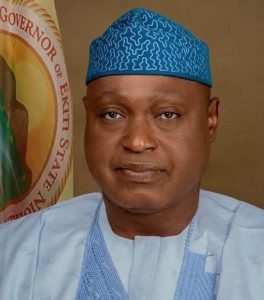Disqualification of Candidates Who Fell Short of Established Criteria: A Litmus Test for Party Supremacy

By OSV
For political analysts familiar with the politics of the progressives, particularly in the South West and especially in Ekiti State, the ongoing political horse-trading over who clinches the sole governorship ticket of the All Progressives Congress (APC) is nothing new. Tracing the history of democratic and progressive ideology in the region from the First Republic to the present confirms the general belief that the Yoruba people are politically sophisticated and cannot be easily manipulated or forced to accept any leader imposed on them.
The South West, predominantly occupied by the Yoruba, has witnessed several attempts by outsiders to impose leadership on them, but such moves have consistently failed. The resistance against colonial rule and the Kiriji War between 1877 and 1893, during which the Ekiti Parapo Confederacy comprising various Yoruba states fought against the Ibadan Empire to resist domination and assert independence, became a defining moment in Yoruba history, showcasing their collective determination to defend their sovereignty. The revolt of Aare Kurunmi of Ijaye, who refused to recognize Alaafin Adelu’s authority, leading to the Ijaye War, also highlighted the Yoruba people’s desire for autonomy and self-governance.
Similarly, the nationalist movement led by the late Chief Obafemi Awolowo, a prominent Yoruba leader, symbolized the region’s refusal to accept British colonial domination. Awolowo championed education, economic empowerment, and political freedom, resisting any form of external control, including the Fulani jihadists who sought to dominate the South West. In more recent times, the united Yoruba front that defended the June 12, 1993 presidential mandate of Chief Moshood Kashimawo Olawale Abiola (MKO), and their collective outcry against the menace of banditry during President Muhammadu Buhari’s administration, are testaments to this same spirit of resistance and political awareness.
On all these occasions, the Yoruba, with Ekiti playing a key role, have consistently demonstrated that they are politically conscious and will not allow anyone, no matter how wealthy or popular, to impose themselves as leaders without the people’s consent. These examples underline the Yoruba people’s historical determination to resist domination and preserve their independence, a reflection of their strong cultural identity and political sophistication.
In light of this, the recent decision by the Working Committee of the All Progressives Congress (APC) to disqualify some aspirants contesting for the party’s governorship ticket in Ekiti State raises serious questions that require honest answers from both the party leadership and the State Executive Council. Who is funding these aspirants, and how are their campaign resources being channeled into the state? Who are the sponsors or godfathers behind them? Are they from Aso Rock, within the state, or even among members of the State Executive Council? Are these aspirants active, financial, and bonafide members of the party? How often do they attend ward and state meetings? Is the party maintaining an updated membership register?
These are critical questions that must be answered as the party seeks to strengthen internal discipline and uphold unity ahead of the 2026 governorship election and the 2027 general elections, particularly in the context of supporting the re-election of Governor Abiodun Oyebanji and President Bola Ahmed Tinubu GCFR. Politics in this part of the world is dynamic, and trust is often transactional. Anyone boasting of automatic victory for the party in the coming elections may not be a true student of history. Victory can only be assured when the necessary internal issues are addressed. As the Yoruba say, Èjò t’ábẹ́lórí á máa sọ̀rọ̀ — the unresolved issues will eventually speak.
The experience of 2014, though different from today’s realities, remains a lesson for all. As expected, only one person can emerge as the APC governorship candidate, and that person must enjoy the confidence of both the party leadership and the majority of members. Any individual or group working covertly against the leadership of the party, no matter how highly placed, should be appropriately sanctioned. The Yoruba have a long history of rejecting imposed leadership. As the next rounds of elections approach, the values of discipline, party supremacy, and respect for progressive ideals must be upheld and protected.
Management, they say, is doing things right, while leadership is doing the right things. This is a clarion call. The recent disqualification of some aspirants should serve as a litmus test for the management and leadership structure of our great party.
Oyebanji Street Vanguard






